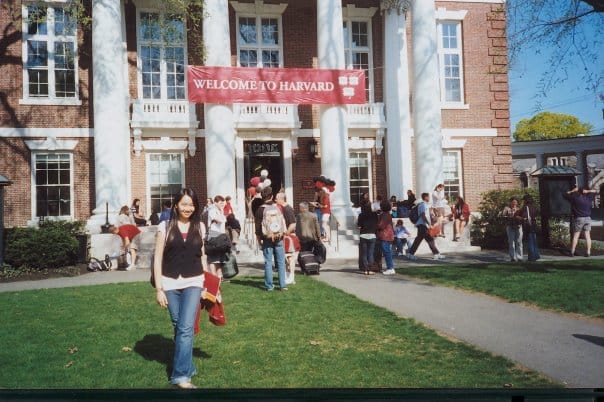I never really understood the phrase “it really hit close to home” until the Boston marathon bombing happened.
That Monday morning was the first day of hiatus week for The Tonight Show, which meant I could come into work at noon in my most comfortable sweats. I’d made plans to work out with my coworker and happily assembled the most aerobic ensemble I could find from my closet: complete with a novelty off-the-shoulder St. Patrick’s day shirt and bright magenta headband.
I strolled to my bus stop, soaking up the rare 10am sun that I usually missed in the office. In my head, I mentally staged the potential pic I could Instagram later, weights in hand, because that’s what post-grad life had become: finding the coolest filters for my everyday life in the real world coupled with verbose captions and an overdose of hashtags.
Halfway into my bus ride, I received an alert from my CBS breaking news mobile app: many injured, bombing at Boston marathon.
What? The Boston marathon was practically an annual holiday in Massachusetts. Every marathon Monday for the past four years while I studied at Harvard, my friends and I made plans to cheer on our classmates, simultaneously envying the Boston University kids who, unlike us, got the day off because the route went through their campus.
I was immediately transported to Boston in the spring time — slowly thawing from another East Coast winter and warming up to welcome the scores of new prospective college students visiting with their families.
But someone had decided to disrupt the tranquility and prey on the unassuming members of one of the country’s strongest communities.
As the week progressed and the breaking news grew worse by the hour, I began to doubt my own journey on the West Coast.
Thoughts plagued me at work, as I fielded daily calls from people wondering how to get tickets for The Tonight Show, others inquiring about the best hotels in Burbank, and a man asking if he could propose onstage to his girlfriend during a taping. Was I making enough of a difference in my life?
I thought back to one of the prospective students that I’d interviewed for Harvard last January. Her passion for changing education policy in the country to benefit low-income schools had stayed with me weeks after our three-hour-long interview on a Friday night. Despite a glowing recommendation from me, I had not received notice from our alumni interview coordinator about an acceptance.
I had staunchly believed that she deserved a place at Harvard; I’d written paragraphs about her ability to fit right in on a campus of students incensed and inspired to make an impact on the world.
The thought of all the deserving students who’d missed a spot at Harvard because of my acceptance crept into my brain. I began to question myself. Should I go back to journalism, the field I’d run away from to pursue my interest in the TV / film world?
The news wasn’t for the weak of heart and those prone to fears.
But, should I be brave and run right back into the reporting field, for the greater good? For the sake of being the one who, instead of shying away from the calamities, crises, and catastrophes of the world, rushes straight into the story in hopes of saving the day?
I felt incredibly selfish, working in the entertainment industry. Having fun, enjoying myself, attending red carpet events, watching The Tonight Show live every day, laughing with coworkers about the latest celeb antics, and soaking up the LA sunshine.
Although I was loving my #LAdventures, I wasn’t making a foreseeable impact in the world. And I felt I owed that to Harvard. I didn’t want to let down the people who had fought to get me in, who had made admitted me over countless incredibly qualified applicants, who had faith in me despite never even having met me.
There was a responsibility that I felt to the institution and a pressure that I couldn’t shake.
I unloaded my doubts and internal conflicts to anyone who would listen — my family, friends, and coworkers. One by one, they echoed the same sentiment: keep doing what makes you happy.
And I realized that, as simple as it sounds, it’s true: if we do what makes us happy, we’re better people for it. The effects may be initially covert, but ultimately implacable.
After reading a recent article in the Harvard Magazine about (c/o ‘92) actor Matt Damon’s interview at the annual Arts First weekend, I felt like I’d found a fitting answer to my dilemma and one that I’m sure my fellow graduates have been grappling with in the real world outside of the Ivy gates.
Damon remarked, “Of all the accolades or movies, when anybody says my name, they say the name of this University, too, and that means a lot to me. I’ve always tried to live my life in a way that deserved the description of being a Harvard person.”
What I took from his words is, that as long as we live our lives and conduct ourselves in manners that reflect the ties that bind us — upholding the values that have been ingrained in our communities, adhering to the scruples that have been passed down from generations within our families, and embodying the morals that have been inculcated in our continuous educational environments, we can very meaningfully make an impact for the cultures, names, and institutions that we represent.
We can inevitably make our impact, whether that means being a courteous customer at a restaurant, a respectful employee at work, or simply an anonymous person engaging in selfless acts of kindness like the ones that inspired the nation after the Boston bombing.


